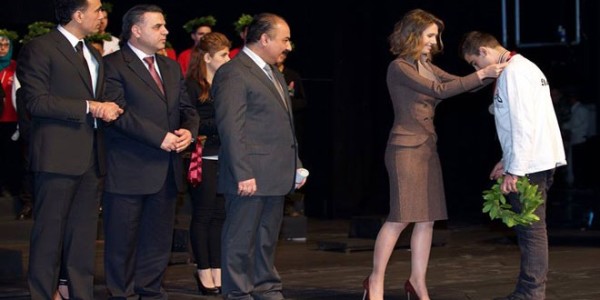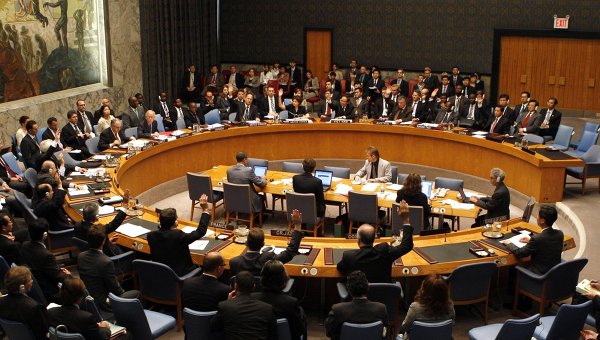PHOTO: The UN Security Council
LATEST
- Ms Assad: Science and Maths Olympiad Proves Youth Will Defend Their Homeland
- More Aid Reaches Madaya and Regime Enclaves
The UN Security Council has held yet another meeting on talks about Syria’s crisis, scheduled for January 25, with still no indication that they will take place.
The UN and a group of countries including the US, Russia, and European and Arab States are hoping to convene discussions next Monday in Geneva, including opposition and Assad regime delegations. However, the attempt has foundered on basic differences, such as the future of President Assad and the definition of which opposition and rebel factions can attend.
After the Council was briefed by UN special envoy Staffan de Mistura, French Foreign Minister Laurent Fabius said, “Obviously we hope that the negotiations will take place but there are some questions which have to be dealt with.”
Russia’s Ambassador to the UN, Vitaly Churkin, insisted that the gathering would proceed, “They are due to be held, after all the work we have done.”
Russia has reportedly rejected the 33-member opposition-rebel negotiating team, established last month at a conference in Saudi Arabia. Claims are circulating that Moscow has put forward the names of 15 people — few, if any of them in opposition-rebel group — to enter talks with an Assad delegation.
Moscow has also showed no sign of relenting in its demand that leading rebel groups, such as Ahrar al-Sham and Jaish al-Islam, should be labelled “terrorist” and barred from the talks.
Russia’s attempt, supported by Iran, foundered last month when a proposed list of “terrorist” factions also included Lebanon’s Hezbollah and Tehran’s Qods Force.
The opposition-rebel negotiating team, established in December, has set preconditions for any negotiations. These include ceasefires with an end to Russian and regime bombing, release of detainees from regime prisons, and access to humanitarian aid. It has also maintained the demand that President Assad leave during a political transition.
While the regime has said it welcomes the talks in principle, President Assad has said they cannot proceed until “terrorism” is completely defeated.
De Mistura told the closed-door Council session on Monday that the goal of ceasefires was still distant. Instead, the envoy said sieges should be lifted throughout the country.
The UN says almost 400,000 people are living in siege conditions — 200,000 in areas attacked by the Islamic State in eastern Syria, 181,000 by the Syrian military throughout the country, and 12,500 surrounded by rebels in two regime enclaves in northwest Syria.
Activists say the UN has underestimated the number of civilians affected by regime forces, putting the figure at close to one million.
See Syria Interview: “Breaking the Silence Around Sieges”
Meanwhile, Russian President Vladimir Putin sought leverage in the discussions on Monday with a meeting with Qatar’s Foreign Minister Khalid al-Attiyah in Moscow.
Attiyah said afterwards, according to Russia media, “The heads of the two countries have agreed that it is necessary to look for political settlement in Syria. That is why, the leaders have agreed to intensify the efforts to put an end to fighting, killings, and hunger among civilians.”
Ms Assad: Science and Maths Olympiad Proves Youth Will Defend Their Homeland
President Assad’s wife Asma has declared that a national science and maths competition demonstrates that Syria’s youth will “defend their homeland”.
Assad, presenting medals at the Syrian Science Olympiad, said that “a lot of people have placed their bets on stopping” the project with the civil war. She hailed the “challenge to prove to the world that Syria’s youth has the will as well as the knowledge” to protect the country.

State TV featured the Olympiad’s participants marching in Damascus:
More Aid Reaches Madaya and Regime Enclaves
A third delivery of aid reached besieged areas, including an opposition-held town where an estimated 60 people have died of starvation, on Monday.
The UN said fuel was delivered to Madaya, northwest of Damascus, where the 40,000 population has been at risk of malnutrition amid a six-month siege by the Syrian military.
On January 11, the first aid — apart from one delivery in mid-October — was finally sent into Madaya after the Assad regime relented following international attention to the crisis.
Food and medical supplies were delivered to nearby Zabadani on Monday, and fuel was sent to the regime enclaves of al-Fu’ah and Kafraya in northwest Syria.
A UN-Red Cross-Red Crescent team, seeking to investigate conditions in the enclaves, postponed their entry as rebels said time was needed to complete security arrangements.

